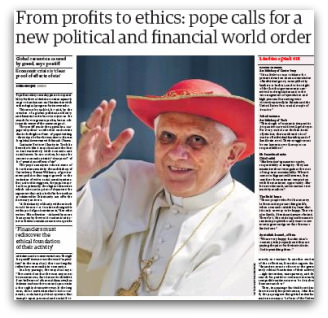 The first encyclical on social teaching by Benedict XVI has finally appeared, some four years after it was first signaled. The question many will be asking is, has it been worth the wait?
The first encyclical on social teaching by Benedict XVI has finally appeared, some four years after it was first signaled. The question many will be asking is, has it been worth the wait?
It is a long and complex document that addresses several fronts. At one stage Benedict seems to get bogged down in internal debates regarding degrees of continuity and discontinuity introduced by Vatican II. At times he seems to promote a highly idealised vision of an economy based on giftedness. At other times he makes quite prescriptive pronouncements on energy consumption. The encyclical covers so many areas any account will need to be selective.
And indeed the commentators are being selective. Papal biographer George Weigel has already decided that Benedict cannot be held responsible for significant amounts of its content, which he places at the feet of the left leaning Pontifical Council for Justice and Peace. Too much emphasis on wealth distribution and not enough on wealth creation is the burden of Weigel's criticism.
Some bloggers have lifted quotes to suggest Benedict is having a go at environmentalists, which is a very selective reading. Overall so many things are touched on with such nuance that both conservatives and liberals will find plenty to like and plenty which they might choose to ignore.
In that spirit this brief piece will be selective too. I would like to focus on two elements which I think are of long term significance, particularly in light of the context of the document, which is globalisation.
The first element is what we might call the new seamless garment of Catholic social teaching. Cardinal Bernadine famously introduced the image of the seamless garment of respect for life, from birth to death, to argue against both abortion and capital punishment. Benedict expands this by speaking of a full 'human ecology', a term he uses a number of times, which covers both human life and the natural environment.
'If there is a lack of respect for the right to life and to a natural death, if human conception, gestation and birth are made artificial, if human embryos are sacrificed to research, the conscience of society ends up losing the concept of human ecology and, along with it, that of environmental ecology. Our duties towards the environment are linked to our duties towards the human person, considered in himself and in relation to others.'
Within this seamless garment the Pope, as we might expect, makes a number of statements on abortion, euthanasia, cloning and the like. What might be more surprising are his comments on the natural environment. While acknowledging the dangers of 'neo-paganism' he makes some very strong environmental prescriptions:
'The international community has an urgent duty to find institutional means of regulating the exploitation of non-renewable resources ... The technologically advanced societies can and must lower their domestic energy consumption, either through an evolution in manufacturing methods or through greater ecological sensitivity among their citizens.'
The climate is specifically mentioned as an issue the international community needs to address. It would seem that Benedict is not a climate change sceptic. One should also note the Vatican's efforts to become carbon neutral through the use of renewable energy sources.
The second element, one which is already causing angst among more conservative commentators, is papal support from strong world governance structures. There is an explicit call for reform of the United Nations and other 'international institutions and international finance' so that they have 'real teeth'.
Further there is 'an urgent need of a true world political authority.' Among the issues that make such a global structure necessary is 'the protection of the environment.' Conservative commentators point to the failure of the United Nations and question whether this is really the way to go.
But the papal argument is compelling. In the opening section of the encyclical he notes the adage, 'ubi societas, ibi ius' (where there is society there is justice), arguing that without social and political ordering there are no structures to ensure just outcomes.
With a globalising economy there is simply no political structure commensurate to the needs of regulating its activities. While such global governance structures may be flawed, even flawed justice is better than no justice at all. The evocation of global governance structures is simply the flip side of the principle of subsidiarity.
Of course there is much more in this encyclical worth noting — support for the role of unions, of cooperatives, of microcredit, an emphasis on the essentially moral nature of economic activity, a solid analysis of the place of technology in human society and so much more. It is not an easy read, in fact probably too long for its intended audience, 'all people of good will'. But it is a worthy addition to the Church's legacy of social teaching.
 Neil Ormerod is professor of Theology at Australian Catholic University. He has coauthored a book with Pentecostal theologian Shane Clifton, entitled Globalization and the Mission of the Church.
Neil Ormerod is professor of Theology at Australian Catholic University. He has coauthored a book with Pentecostal theologian Shane Clifton, entitled Globalization and the Mission of the Church.